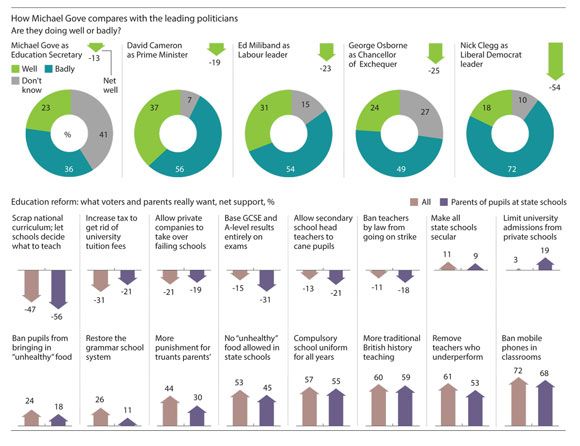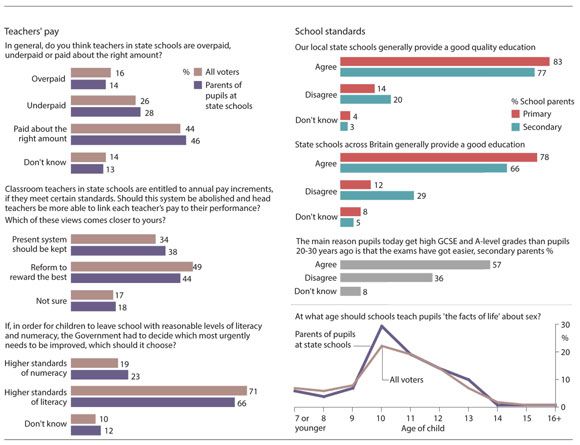Michael Gove has pursued education reform. Parents don't share his view that the system is broken (© John Stillwell/PA Wire)
Were Michael Gove a student taking his GCSEs, he would struggle to get a decent grade from Britain’s parents on his favourite subject: education reform. He would need to spend extra time on his coursework, especially on the topic labelled “persuasion.” Few parents think he is doing well—though a great many have yet to make up their minds about his performance.
YouGov’s survey for Prospect has found that parents, and the wider public, want changes. It’s just that their agenda is not quite the same as his. They back his wish to make it much easier for headteachers to sack underperforming teachers, but not for restricting GCSEs and A-levels to exam-only challenges. They would welcome a return to “traditional” history, in which pupils learn dates, events and pride in Britain, but oppose Gove’s long-term ambition to give private, profit-making companies the chance to take over failing state schools.
Were Gove to seek a popular agenda for the next stage in his reform programme, he would make school uniforms compulsory for all pupils and restore grammar schools and the 11-plus exam throughout Britain. In fact, it’s not so much that parents and public want an innovative future as a return to the days of Mr Chips—or, to be more precise, a version of the past as seen through rose-tinted memory spectacles. The one common feature of the past that parents don’t want to resurrect is corporal punishment.

To view a full sized version, click here
However, all these findings must carry the qualification that Gove’s reputation, and views about his reforms, could well change. When we ask the public how he is doing as education secretary, we find that 23 per cent say “well” and 36 per cent “badly”—but the largest number, 41 per cent, don’t have a view either way. The proportion of “don’t knows” is far higher than for David Cameron or George Osborne.
Perhaps that’s not surprising: polls have long found that few cabinet ministers beyond prime minister and chancellor have a strong reputation with the majority of voters who pay little day-to-day attention to politics. More striking are the figures for the parents of children at state schools—around 7m adults. One might expect them to have more definite views about the performance of Gove. Yet their verdict is virtually identical to the electorate as a whole: 23 per cent well, 36 per cent badly, 41 per cent don’t know.
One of Gove’s problems is that for state school parents to embrace his reforms enthusiastically, they would need to share his view that the system he inherited is broken. They don’t. As much as 83 per cent of primary school parents think their local primary schools “generally provide a good quality education”; the figure for secondary school parents about local secondary schools is slightly lower, but still a healthy 77 per cent. There is greater dissatisfaction among the public about state secondary schools nationally but, even here, a two-to-one majority thinks they provide a good education. Public satisfaction with primary schools nationally is even higher—a four-to-one majority is happy with their performance.

To view a full sized version, click here
The story is the same for teachers’ pay. Just 14 per cent of parents think teachers “are generally overpaid.” Far more think they are underpaid (28 per cent) or “generally paid about the right amount” (46 per cent). It is, of course, perfectly possible to think teachers are generally paid about the right amount, and still to want the system reformed, so that pay increases go only to the better teachers, and are not spread around in the form of almost automatic annual increments. On this, parents are divided: 44 per cent support reform, “to provide an incentive for teachers to do better”; but almost as many, 38 per cent, want to keep the present system because “it is fair and prevents damaging competition between teachers at the same school.” Perhaps Gove should give higher priority to making it easier for head teachers to sack poor classroom teachers: this has the support of 71 per cent of parents.
While a Mr Chips returning to life would undoubtedly praise parents for many of their views, there is one issue on which he would surely be appalled by what they think. They agree, virtually unanimously, that schools should teach the “facts of life” about sex. As many as 65 per cent think this is a task for primary schools, while a further 27 per cent think it should be left until pupils are 12 or older. But only 4 per cent of parents think schools should steer clear of the subject and leave the job to parents.













